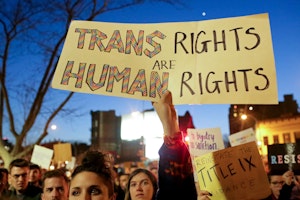To Stem Violence, States Must Recognize Trans Identities
By Anna Kirey
Sixteen years ago this month, a transgender woman named Rita Hester was brutally stabbed to death in her apartment in Allston, Massachusetts. Her death launched a global movement to remember and honor trans people who were murdered because of their identities. Since that tragic incident, November 20 has been known as Transgender Day of Remembrance.
The psychiatrists, judges, ministry officials, and other government representatives who make decisions about transgender people’s lives in Eastern Europe and Central Asia know little about this day’s significance. What they do know is how to create obstacles for trans people who are seeking to change the gender listed on their official documents—like passports or driver’s licenses—to reflect their true identities.
In Ukraine, for instance, in order for the government to recognize a trans person’s gender identity, the individual needs to stay in a psychiatric institution for up to 45 days. Then, only when a commission of forensic psychiatrists in Kiev have “confirmed” their diagnosis of “transsexualism” and the trans person has paid for invasive and sterilizing surgeries, will the commission give them permission to change their documents.
Only about 10 people a year are able to undergo this process. Hundreds of others have to survive constant outing, harassment, and the threat of violence that comes from presenting documents that do not match their identity and appearance. When one raises these problems with the Kyiv-based commission, they only shrug and say that rules are rules.
In Russia the law about changing one’s gender is so vague that there are multiple interpretations of it, which usually means that trans people have to go to court. In some instances the courts recognize trans people’s gender quickly and painlessly, but many require arbitrary medical interventions that aren’t mentioned in the law.
A court in Nizny Novgorod, for example, argued that requiring surgery in order to officially change one’s gender is “necessary for the protection of morals and the protection of the rights and freedoms of others.” Courts see trans people’s lived experiences as violating the rights of others, when in reality existing legislation puts trans people in a legal and social limbo that increases their vulnerability.
Even for something as simple as a name change Russian registry offices are likely to send someone to court if the name is not traditionally male or female, or if it clearly does not match the passport gender of the person. A simple change of name could help someone to avoid unnecessary breaches of privacy when they cross the border or go to the bank.
Organizations like Insight and others have been working in Ukraine and Russia to challenge these rules through advocacy and litigation, while Transgender Europe documents transphobic murder in Europe every year through its Transrespect versus Transphobia project. In 2014 the project added 226 more names to the list, which now has 1,612 reported killings of trans people in 62 countries since 2008.
For many trans people, this threat of violence is simply a part of daily life.
Just this week, a trans woman who is dear to me received death threats on the Russian social network Vkontakte. Someone she doesn’t know lifted a photograph from her profile and posted it on his page with a poll about the best way to kill her. He suggested burning her alive or shooting her, and called her “an animal” and a “genetic mutation.”
I responded by telling the man that I would file a complaint against him with the Russian authorities. My comment, in turn, prompted a series of threats toward me and a comment that Russian police would side with the same transphobic views. The police registered my complaint, but I do not anticipate a positive outcome.
Unfortunately, this is the reality in which trans people in the region live. The state not only ignores such threats and violence but contributes to it by not recognizing transgender identities.
Until August 2016, Anna Kirey was a senior program officer with the Open Society Public Health Program.


